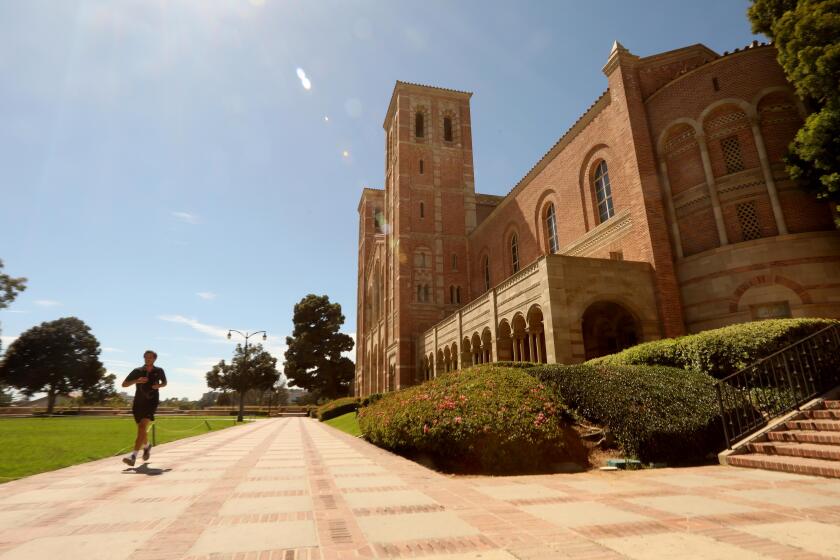Trailers, Shacks Dot Tiny Lots in Kagel Canyon : County Cracks Down on Bootleg Homesteads
On a clear day, Clara McNey can see the San Fernando Valley, downtown Los Angeles and Catalina Island from her home of 40 years at the top of Kagel Canyon.
But, on the day two years ago that Jerry Overlock moved down the hill from her, McNey saw red.
Overlock and his wife hauled four small sheds and a pair of travel trailers onto a tiny lot in the middle of the brush-covered slope. He rigged up a solar panel for power, bought jugs for water, and called the place home.
McNey and the handful of other families who live in conventional houses at the remote upper end of the canyon above Sylmar and Lake View Terrace were angered when they discovered that Overlock had come to stay--even though he had no building permit, water supply, electricity or bathroom.
Others Investigated
On Tuesday, Los Angeles County officials called a demolition company to remove Overlockâs home as part of a crackdown on the use of lots in the canyon that are too small to be legally developed. They said they are also investigating the use of about 10 other parcels.
As many as 4,000 of the 60-by-40-foot lots exist along a mile-long section of Kagel Canyon Road. They were apparently created about 60 years ago when a developer created a subdivision for weekend mountain cabins, officials said.
Despite the spectacular Los Angeles view from the mountainside, only nine homes had been developed in the old tract until about three years ago. The lack of a reliable water supply in the area was the primary drawback.
âWe hauled water up from San Fernando for a long time,â McNey said. âThen we found a spring back up in the hills and put in a 1,000-foot-long pipe.â
Others in the canyon also use springs, although one shared by several families has recently dried up and residents are putting in a deep new well.
Homeowners say they are worried that their wells will be contaminated by the newcomers who have scattered small trailers, old buses and camper shells among the chaparral next to a network of âstreetsâ that exists only on paper.
âPeople will find an old camper and move it in on one of these lots,â said Gerald Burris, an aircraft worker who has built a 3,800-square-foot home by combining 10 of the tiny parcels into one buildable pad.
âYou wake up in the morning and theyâre there. Somebody had a trailer in front of me for months. There were no sanitary facilities in it. We were worried about pollution in our well.â
Burris said ownership of some of the tiny lots changes âalmost yearlyâ as investors discover that they cannot legally build a home on a 60-by-40-foot lot under current county standards.
Those rules include setback regulations for structures and special restrictions for septic tanks and wells--including percolation requirements and a minimum 150-foot separation between wells and septic leech lines.
That doesnât stop the sale of the lots, Burris said. He displayed an auction notice for a Sept. 27 land sale to be staged by a private company that advertises a 40-by-60-foot lot near him. The minimum bid: $400.
Skip Cooke, who has lived 10 years near the top of the canyon in a remodeled 1930s-era cabin, said longtime residents favor enforcement of building codes and health regulations.
âPrecedent for Everyoneâ
âThe laws were made for the protection of peopleâs rights,â said Cooke, a heavy equipment operator for the City of Los Angeles who composes music at his cabin at night. âIf one guy gets away with not abiding with the law, it sets a precedent for everyone else.â
Property rights were on Overlockâs mind, too, as a 27-ton bulldozer moved in on his shed-like structures Tuesday, crushing two of them and leaving two more to be moved by noon today by Overlock.
âWithout due legal process, through the force of might, they did what their supervisors wanted,â said Overlock, a 41-year-old civil engineer. âThere was no court order, nothing signed by a magistrate. It was just raw bureaucratic power.â
Overlock said his solar panel and batteries provided enough power to run a color television and video recorder. He said water carried up the mountain in a tanker truck was also solar-heated. One of the travel trailers had a toilet and waste holding tank that was emptied by hand, he said.
âIt cost me $30 a year in property taxes to live here, thatâs all,â Overlock said. âWeâd lived in Sylmar in a regular house but didnât have the money for rent . . . economic liberty, thatâs why weâre here.â
Wife Ryan Overlock, 30, described her husband as âa rebel from way back.â Despite the hostility of other canyon residents, the two of them will remain on their property, she said. âWeâll probably move a tent here.â
County officials said Tuesdayâs crackdown came after canyon homeowners complained about squatters and illegal structures to the office of county Supervisor Mike Antonovich.
Ken St. John, an inspector for the countyâs Department of Building and Safety, said Overlock was given several chances to make his property comply with county codes before the demolition order was issued May 6.
The listed owner of the property, a Beverly Hills woman, will be billed for the cost of Tuesdayâs cleanup, said Sherley Hollingsworth, a senior county building inspector in charge of demolitions.
Other residents of the small lots acknowledged Tuesday they are also under pressure from the county.
âDonât Bug Anybodyâ
âTheyâve thrown out five or six guys already because there are a few people who donât want us here,â said Phil Rodriquez, 61, who lives with his wife, Martha, in an 18-foot travel trailer near Overlockâs sheds. âWe donât bug anybody. Weâre staying until they throw us out.â
Wayne Gonce, who lives in a converted truck trailer and has built a small stucco garage on two lots he owns, said he has hired an attorney to help protect his investment. He said he paid $7,000 for the lots three years ago and âgot takenâ on the deal.
âWeâre close to having a shooting up here,â Gonce, 57, said. âPeople have come down to my property with guns. Next time someone waves a pistol at me, the shooting starts.â
More to Read
Sign up for Essential California
The most important California stories and recommendations in your inbox every morning.
You may occasionally receive promotional content from the Los Angeles Times.











